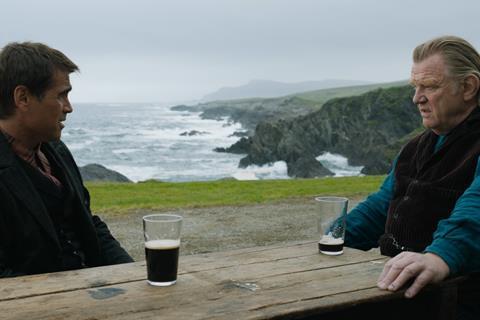Colin Farrell and Brendan Gleeson attempt to settle scores in Martin McDonagh’s darkly comic 1920s-set Irish drama

Dir/scr: Martin McDonagh. Ireland/UK/USA. 2022. 109mins
A rocky coastal path, pony-drawn traps, a rainbow in the sky and Colin Farrell striding along with a top o’ the morning spring in his step… This could be the corniest kind of Hollywood Irish fantasy, if The Banshees Of Inisherin wasn’t written and directed by Martin McDonagh, whose acclaimed stage plays and films (including In Bruges and 2017’s Three Billboards Outside Ebbing Missouri) were rightly celebrated for their mischievous and very dark irony. Banshees starts with a light comic touch as a rural character farce, but then gets progressively darker and more macabre, with resonant echoes of modern Irish history hovering off-screen and clouds of Beckettian despair hanging overhead.
Above all, McDonagh is paying homage to Irish theatrical forebears
Following its premiere in Venice Competition, where it won Best Actor for Farrell, The Banshees of Inisherin will head to Toronto before an awards-primed US and UK theatrical release in late October. Unpredictably counter-intuitive performances from a cast headed by Farrell and Brendan Gleeson, plus McDonagh’s deliciously rhythmic comic dialogue, should give viewers a very good time – but may send them out shivering.
The story of a seemingly inconsequential feud that spins wildly out of control, the film is set in April 1923 – shortly before the end of the Irish Civil War – on the island of Inisherin, which doesn’t exist, although there is an Inisheer – McDonagh’s film was shot on Inis Mor, the largest of the Aran Islands. It’s a place where nothing of interest ever happens, and where the local nosy postmistress is forever pressing people for news of any sort. Life goes on with amiable predictability, or so thinks farmer Pádraic Súilleabháin (Farrell) as he drops by to summon fiddle player Colm Doherty (Gleeson) for their daily afternoon pint at Jonjo’s pub.
Today, however, Colm isn’t interested – and eventually tells a baffled Padraic that it’s because he simply doesn’t like him any more. Padraic does his best to settle their new differences but Colm resists, leaving his erstwhile pal to receive cosy domestic consolation from his sister Siobhan (Kerry Condon, from TV’s Better Call Saul) and their resident donkey Jenny. Also offering unsolicited advice and musings is Dominic (Barry Keoghan), the wise-fool son of the obnoxious local copper (Gary Lydon).
Determined to shake off Padraic’s attentions, Colm decides on a radically self-destructive course of action – which is where the film takes a characteristically nasty McDonagh turn – while Padraic, tired of being the island’s acknowledged dull but decent guy, decides it’s time to respond differently. Meanwhile, glum widow Mrs McCormick (Sheila Flitton) issues baleful predictions, and the sound of gunfire on the mainland signals the executions of IRA fighters by Free State militia – or perhaps it’s the other way round, no-one’s quite sure.
In an initially confounding role swap, Martin McDonagh – who has dealt with Irish themes in his theatre but not, until now, in his cinema work – enters territory previously mapped out by his brother John Michael McDonagh in The Guard and Calvary, both of them starring Brendan Gleeson. Banshees taps some of the broad self-mocking Irish humour of the former film, plus the Catholic-themed metaphysical angst of the latter (there are a couple of priceless confession scenes here). But above all, McDonagh is paying homage to Irish theatrical forebears – Sean O’Casey in the political dimension and J.M. Synge in the romanticised ruralism. As for the iconography, it’s hard not to think of the idealised roistering of John Ford’s The Quiet Man, with Condon’s brightly-clad, red-haired character forthrightly channelling the spirit of Maureen O’Hara as the lonesome, literary, eminently sane Siobhan.
Farrell makes a beautifully modulated transition from a gentle soul embodying human decency to an altogether different character, while Gleeson’s lugubrious, monolithic bulk makes his melancholy, careworn fiddler an imposing, perplexing and increasingly scary figure. Irish stalwarts including Pat Shortt make up the island population, while Keoghan is a scene-stealing presence playing the apparent buffoon whose shy vulnerability conceals an undercurrent of genuine pain.
McDonagh’s language is ripe, and at times comically incantatory. The title’s seemingly supernatural connotations actually relate to a tune that Colm is writing – he just likes the repeated ‘sh’ in the title – but there’s more than a hint of other-worldly tragedy here, limned in parallel with the allusions to political conflict whose root causes no-one can quite remember.
Along with the fiddle music, Carter Burwell’s knowing, mock-folksy score is matched with classical passages from Orff, Brahms et al, plus those Bulgarian choral voices that are as balefully banshee-like as you could wish for; a perfect match for the dark clouds massing over the wild landscapes captured to full mythic effect by Ben Davis’s photography.
Production company: Blueprint Pictures
Worldwide distribution: Disney/Searchlight
Producers: Graham Broadbent, Pete Czernin, Martin McDonagh
Cinematography: Ben Davis
Production design: Mark Tildesley
Editing: Mikkel E.G. Nielsen
Music: Carter Burwell
Main cast: Colin Farrell, Brendan Gleeson, Kerry Condon, Barry Keoghan















![[L-R]: Amanda Villavieja, Laia Casanovas, Yasmina Praderas](https://d1nslcd7m2225b.cloudfront.net/Pictures/274x183/6/4/1/1471641_pxl_20251224_103354743_618426_crop.jpg)








